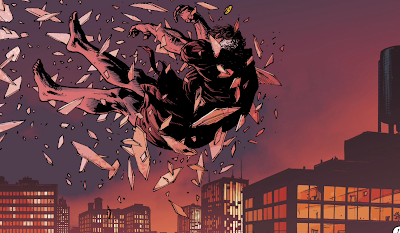Samuel Beckett
And that is the true story of how Stan Lee created Thor, off the top of his head, without any input from anyone else.
But Stan never quite gave up on the idea of The Amazing Super-God.
He wasn't joking. In 2016, Lee's performance poem God Woke! was published in comic-book format, with Kirby-a-like illustrations by Fabian Nicieza. It is as close to a Marvel Comic starring Super-God as we are ever likely to get.
The endless internal rhymes seem to have come directly from Poe’s The Bells
It seems that the more powerful a character is, the less personality he has. Galactus, the closest thing the Marvel Universe has to a deity, speaks entirely in declarative sentences about how powerful he is. (Eternity rarely gets beyond "I am Eternity" and Kirby's Celestials don't communicate at all.) Since God is ultimately powerful, Lee imagines him as being almost entirely personality-free. Nicieza draws him as a giant, featureless male figure with stars and planets drawn over his body. Lee writes him as an innocent moron, like the Hulk or Frankenstein, stumbling around the universe failing to understand the strange humans who populate it. Since humans spend most of their lives being baffled by God, the idea that God is baffled by man is a fair-to-middling literary conceit.
God’s complaints — and let’s face it, we are all a bit cranky first thing in the morning — take up the rest of the poem. God complains that the human race are making too much noise; and in particular, he is irked by the sounds of their prayers. He has three main objections to humans praying. Stop me if you’ve heard them before.
God then goes off an a new track. Humans have no right to ask him anything at all: his duty was fully discharged by bringing them to life in the first place. Creation had nothing to do with a divine master-plan after all: humans were only ever God’s plaything.
only man
The final stanzas are vintage Stan Lee bullshit and I mean that in a deeply affectionate way:
All of these usages can be defended: but it is terribly easy to fall into nonsense without intending to. Someone says "Where was God during the last high school massacre?" and you reply "Don't you remember? You threw God out of school". The word "God" is being used to mean "religion" or "state religion": "we threw God out of school" means "religious studies ceased to be mandatory." But the same word is also being used to mean "the idea that the universe is just and arbitrary suffering doesn't occur." "If the universe is just, why do the innocent suffer?" is a good question. "The innocent suffer because there is no longer a daily religious assembly in this district" is a terrible answer.
I don’t think that Stan Lee ever seriously supposed he could turn the God of religion into a superhero character. A comic book about "the god of the Marvel Universe" — the most powerful cosmic entity in that entity filled cosmos — is perfectly imaginable. It may even be that that is how God Woke was originally conceived: a Silver Surfer story from the point of view of Galactus. But once Stan has named his protagonist “God”, he can hardly avoid talking about religion — or philosophy, or reality at the most fundamental level, or the ground of our, in a very real sense, being. He presumably doesn't believe that the actual Deity, if he exists, is actually capable of crying, or sleeping, or forgetting. “Galactus turned aside” or “Odin wept” are descriptions of things which happen to characters on the inside of a story. But "God cried" is a theological statement. We are entitled to ask "What do you mean by that?"
Only atheists ever talk about a malevolent Deity. No-one who seriously believes in a God believes in a bad one. Indeed "Bad-God" may be a contradiction in terms, like "square circle". The ultimate Thing is the ultimate Good Thing almost by definition.
When someone says "God is bad" or "God has failed" they generally mean "the idea of God has failed" or "God is bad idea." When Stan Lee tells us that God created the world and went to sleep, he must mean "When we look at history, we cannot reasonably suppose that there is a God who is actively in charge of it", or more simply "History shows that God does not exist." When Stan Lee shows humans calling to God and God saying “Stop being so noisy” he is saying "No-one listens to or answers human prayers" or more simply “Religion is a pointless waste of time because God doesn’t exist.”
But perhaps the poem is more hopeful than that. After all, God recognizes his shortcomings on the final page. Again, is is impossible to literally suppose that God is capable of recognizing his own faults and getting better at Godding. "God admits his flaws" can only mean "Human beings should recognize the flaws inherent in their own idea of God. So the message could be: "The Gods of religion cannot save us; but the alternative is not atheism, but a better idea of God. If we would shut up for a minute and listen to the real God, over and above our religious ideas about him, all manner of things may still be well."
*
he looked his last
he turned aside
That first performance of God Woke! took place in January 1972. The following August, he relinquished control of the Amazing Spider-Man and the Fantastic Four. He would be admired and revered — worshiped, even — as Creator of the Marvel Universe right up until his death in 2018. But he would never be a comic book writer again.
These things take me, like, forever to write. If you think they are worth while, please consider donating a dollar or two via my Patreon.


.jpeg)






